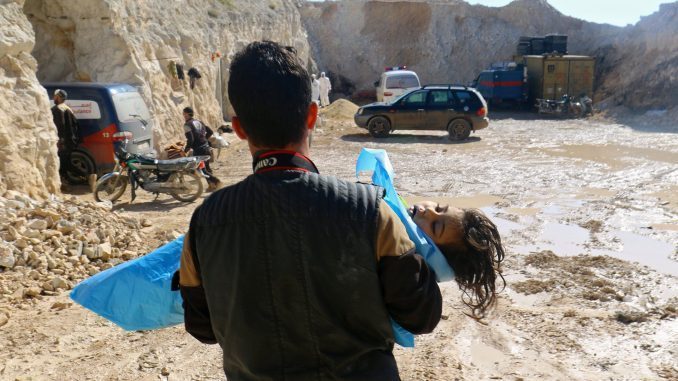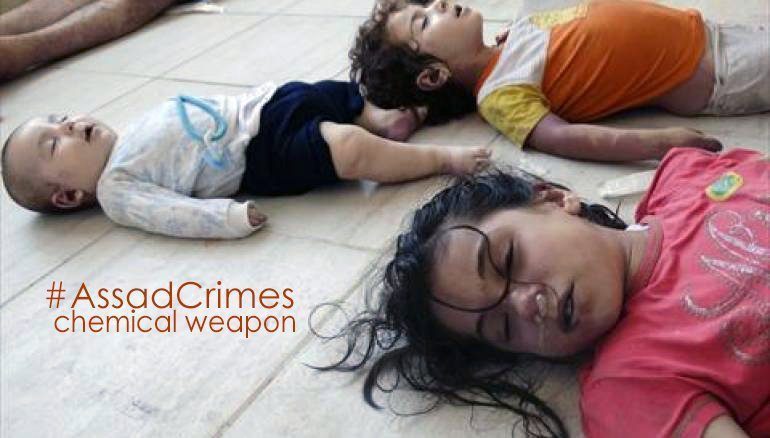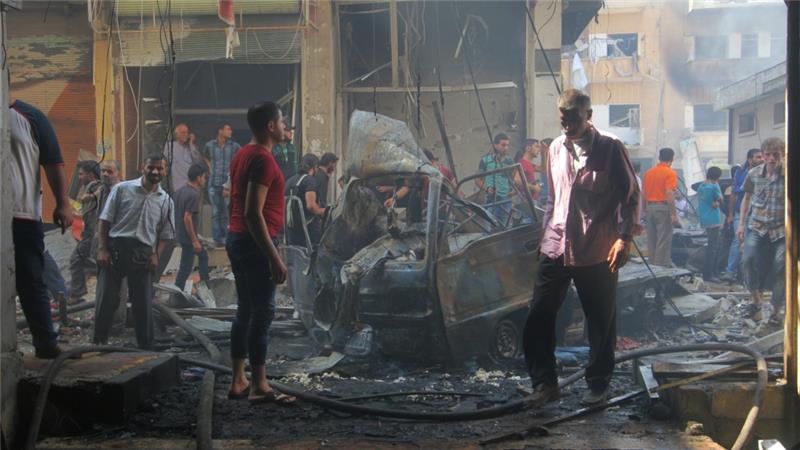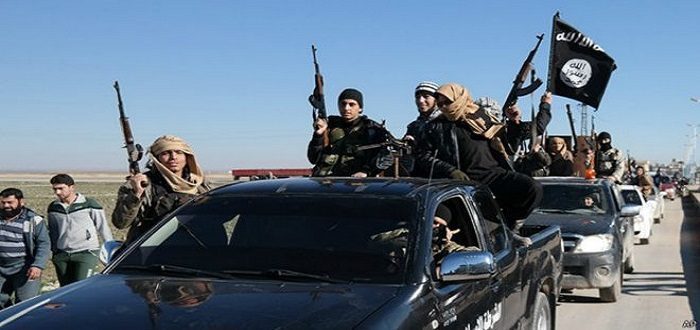
The dispute escalated in the UN over the latest deadly chemical attack in Syria, as the United States, Britain and France proposed a resolution to condemn the attack, while Russia rejected it and proposed another one, hinting once more to the inability of the UN to take any measures to stop the crimes in Syria.
More than 60 civilians were killed in Syria in a new chemical attack carried out by Assad regime’s air force on the rebel-held Idlib province, doctors and monitoring groups have said.
The Syrian Observatory for Human Rights said the attack caused many people to choke or faint, and some had foam coming from their mouths, citing medical sources who described the symptoms as possible signs of a gas attack. All the children were under the age of eight.
Opposition activists and the AFP news agency, citing one of its journalists on the scene, later said a rocket had slammed into a hospital where the victims were being treated, bringing rubble down on medics as they struggled to deal with victims.
The civil defense, also known as the White Helmets – a rescue service that operates in opposition areas of Syria – said jets struck one of its centers in the area and the nearby medical point.
The casualties have been distributed across a wide range of hospitals in Idlib, with some sent north towards Turkey.
“The total number of wounded is incredible, so far it’s over 200,” said Mohammad, a doctor at another hospital in Idlib.
The World Health Organization said there was reason to suspect a chemical attack, with some victims displaying symptoms suggesting exposure to “a category of chemicals that includes nerve agents”.
Medical charity Medicins Sans Frontieres (MSF) said people it treated had symptoms consistent with nerve agents such as Sarin.
“MSF saw eight patients with symptoms – dilated pupils, muscle spasms, involuntary defecation – consistent with exposure to neuro-toxic agents such as Sarin,” the group said in a statement.
This attack is the deadliest chemical attack in Syria since sarin gas killed hundreds of civilians in the rebel-held Ghouta area near the capital in August 2013. Western states said the Assad regime was responsible for the 2013 attack but it denied the charge.
Russia, however, said that the attack’s story was a lie, adding that the poison gas belonged to rebels and had leaked from a weapons depot hit by Assad regime air force.
But Russia’s claims were rejected by the global powers, which said that it is clear that Assad regime is responsible for this attack.
New UN resolution
The United States, Britain, and France blamed Assad regime’s forces for the attack.
The draft resolution text says Syria’s government must provide an international investigation with flight plans and logs for Tuesday, the names of all helicopter squadron commanders and provide access to air bases where investigators believe attacks using chemicals may have been launched.
It asks U.N. Secretary-General Antonio Guterres to report monthly on whether the Syrian government is cooperating with an international investigation and a fact-finding mission into chemical weapons use in Syria.
The proposed measure also requests the joint UN-OPCW investigative panel begin work immediately to identify the perpetrators of the attack.
The draft resolution “expresses its outrage that individuals continue to be killed and injured by chemical weapons in the Syrian Arab Republic, and expresses its determination that those responsible must be held accountable.”
The United States has warned it could take unilateral action if the United Nations fails to respond to the attack.
“When the United Nations consistently fails in its duty to act collectively, there are times in the life of states that we are compelled to take our own action,” US Ambassador to the UN Nikki Haley said on Wednesday.
Haley lashed out at Moscow for failing to rein in Damascus, standing in the council chamber to hold up photographs of victims – one showing a young child lying lifeless, a mask covering his face.
“How many more children have to die before Russia cares?” she asked.
“If Russia has the influence in Syria that it claims to have, we need to see them use it,” she said. “We need to see them put an end to these horrific acts.”
Russian refusal
Ahead of the emergency session on Wednesday, a spokeswoman for Russia’s foreign ministry said the draft resolution was “anti-Syrian”, adding it “pre-empts the results of an investigation and just immediately designates the guilty”.
It said the deaths were caused when a Syrian air strike hit a “terrorist warehouse” used for making bombs containing “toxic substances”, and pledged to continue its military support for Assad.
Syria’s permanent representative to the UN Munzer Munzer rejected what he called a “falsification of the facts” in Khan Sheikhoun, adding that “terrorist groups” had gained access to “toxic chemicals” with Turkish government assistance.
Russia’s Foreign Ministry spokeswoman Maria Zakharova said also that the resolution is “unacceptable” for Moscow and based on “fake information”.
“Unfortunately, based on totally fake information, the United States, France and Great Britain have once again planted – one cannot put it any other way – into the U.N. Security Council a draft resolution which has a completely anti-Syrian character,” the RIA-Novosti agency quoted Zakharova as saying.
The resolution would exacerbate tensions within Syria and throughout the region, she said.
Zakharova was also quoted by the Interfax news agency as saying: “We do not believe it is expedient to pass a resolution on the chemical weapons attack in its present form.”
What has the UN done until now?
As the Syrians waited for the global powers to make real moves for protecting them, all they got were statements.
In a report on February, the US-based rights group Human Rights Watch (HRW) said it had verified eight chemical attacks during the offensive from November 17 to December 13, adding that four children were among the victims.
HRW said it had interviewed witnesses, collected photos and reviewed video footage to reach the conclusion that chlorine bombs were dropped from government helicopters during the operation.
HRW said its report did not find proof of Russian involvement in the chemical attacks, but noted Moscow’s key role in helping the government to retake eastern Aleppo.
However, Russia and China have vetoed a UN Security Council resolution backed by Western powers that would have imposed sanctions on Assad regime over these attacks, reflecting the inability of UN to take an independent decision that can stop Assad regime’s crimes.
The US ambassador to the UN, Samantha Power, have previously said the use of chemical weapons was “barbaric” and called for “all states to support strong and swift action”.
Ms Power accused the Assad regime of violating a September 2013 resolution which orders the UN Security Council (UNSC) to impose measures for “any use of chemical weapons by anyone in the Syrian Arab Republic”.
Ned Price, a spokesman for the US National Security Council, said it was now “impossible to deny” the Syrian regime used weapons in violation of international law.
“The United States will work with our international partners to seek accountability through appropriate diplomatic mechanisms,” he said, adding that Russia and Iran should participate with UN member states.
French ambassador to the UN Alexis Lamek also said: “the council will have to act”.
“When it comes to proliferation, use of chemical weapons, such weapons of mass destruction, we cannot afford to be weak,” he added.
However, their statements were not translated into actions on the ground.
President Barack Obama said the use of chemical weapons in Syria was a “red line” for him but then withered when Assad’s forces used sarin-filled shells to kill some 1,400 Syrians men, women, and children in 2013. America has armed and trained Syrian rebels, but only in small numbers. It never bombed Assad’s forces their behalf or established a no-fly zone where Syrian civilians might be safe from Syrian and Russian airstrikes.
The Syrian crisis began as a peaceful demonstration against the injustice in Syria. Assad regime used to fire power and violence against the civilians and led to armed resistance. 450.000 Syrians lost their lives in the past five years according to UN estimates, and more than 12 million have lost their homes.




